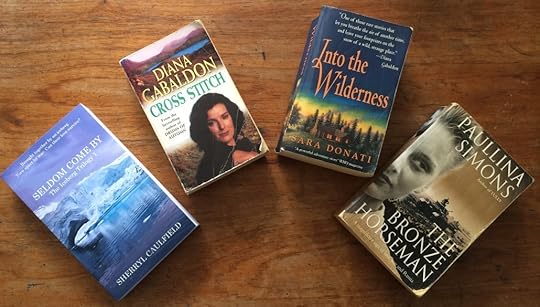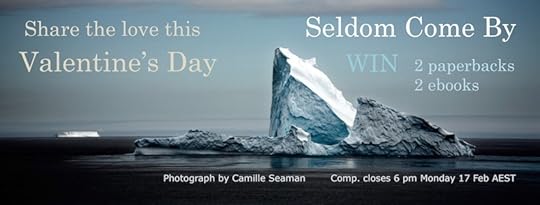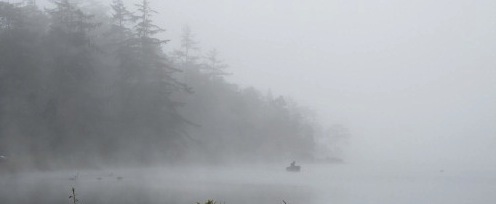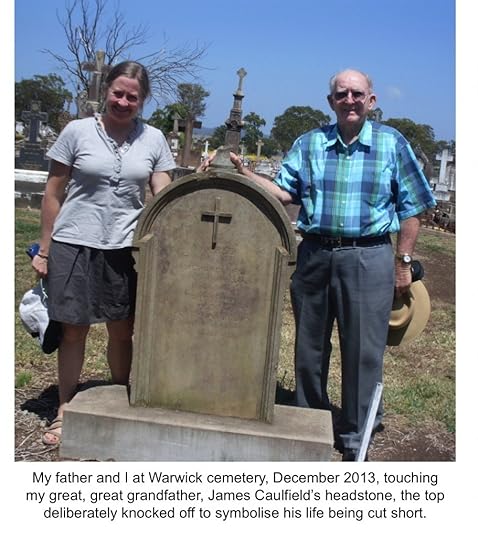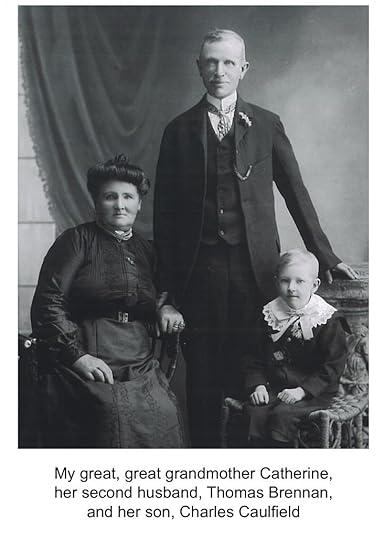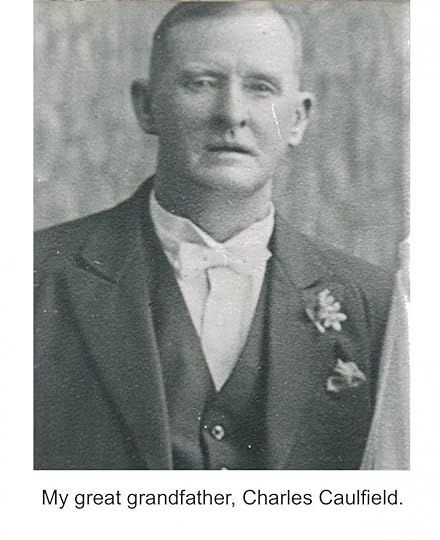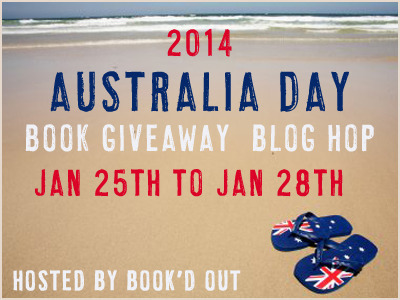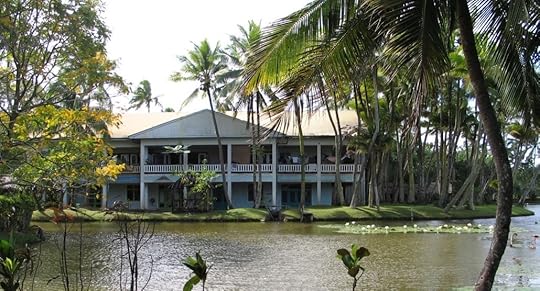Sherryl Caulfield's Blog, page 3
March 27, 2014
Books About Wolves
Even since reading White Fang as a child, I've enjoyed ...
The post Books About Wolves appeared first on Avada Demo.
March 23, 2014
My Writing Process
Thank you to my dear friend, and highly versatile writer and author, Julie Fison, for inviting me to be part of My Writing Process Blog Tour. Julie and I go way back. In fact that tiny faded pic is of the two of us holidaying one summer on Great Keppel Island. These days, Julie writes travel articles, children’s books (The Hazard Rivers Series), teenage romances and more. In fact she’s going to be a guest here next week to celebrate the launch of her upcoming book, How to Get to Rio, so please pop back next week.
In the spirit of this tour I am going to answer 4 questions about my writing:
1) What am I working on?
I am currently itching to work on Come What May, the second novel in The Iceberg Trilogy. I’m hoping to launch it in the second half of 2014. It’s sitting at around 108,000 words and I thought I had finished it a few years ago but the characters have been talking to me of late and I realise I have more of their life to tell. Consequently, I’m excited and longing to get back to them. The story is set in the years 1939 through to the mid 1970s. It starts in Newfoundland then moves across Canada so that a lot of the story takes place in Northern Ontario, Saskatchewan and Winnipeg. It continues Samuel and Rebecca’s story while moving to the next generation, primarily their daughter, Evangeline – Gene as she is known by everyone. In Come What May readers get to meet a wonderful new character by the name of Sonny (pronounced Sunny) who is a very talented pilot.
2) How does my work differ from others of its genre?
I think this question could perhaps be more objectively answered by my readers! I write epic adventurous love stories. Seldom Come By and Come What May are historical and maybe by the time Come Full Circle is released it will be historical too! (It’s set in the 1990s). And they’re romantic as well…however if you put the words ‘historical romance’ together you might think bodice ripper and if you did, you’d be way off the mark.
I think there are three aspects to my writing that I hope over time will define my style:
Intensity of emotions. I want my characters (and my readers) to go through the full spectrum of human experiences and emotions. Their lives are certainly deeply felt by me as the writer. I cried for them as I wrote about them. Even this line got me started: as three generations of Dalton men folded their hearts and their lives in each other’s arms.
A sense of place. I love landscapes, seascapes and nature. I want my writing to reveal the visual splendour of a place in a way that has almost a cinematic quality to it. I want to capture the imagination of my readers and transport them to places that are almost otherworldly. There are other books that do this as well so I can’t say that’s unique about my work.
‘Signature Moments’ are where I combine the two, so where emotions like elation, heartbreak and enlightenment unfold in a sublime setting, creating an intense emotional connection for the reader. The iceberg scene in Seldom Come By is one such example.
The unexpected. The other element, which I do see as a hallmark of my work, is an unexpected and shocking plot development. I can’t really say much more than that other than to say people will be reading along with a sense of where my story is going and then something happens that totally challenges that. Some in my inner circle call this the ‘Gasping Moment’.
3) Why do I write what I do?
A starting point was to come up with a story that would explain one unusual woman I encountered during my travels in Canada.
But now that her and others’ stories have evolved it’s almost in a bizarre way like I know these people and have been given permission to tell their story, to bear witness to their pain and suffering, but also their joy, and that there are learnings to their stories.
But why did I want to write in the first place? I think it comes down to that Helen Keller quote: “The best and most beautiful things in the world cannot be seen or even touched – they must be felt with the heart.” I wanted to connect with people’s hearts.
4) How does your writing process work?
I am not a full time writer. I long for the day when I can be. My year tends to be made up of chunks of marketing project work – the feast and famine adage applies – so what I like to do is carve out several weeks at a time when I can, as much as possible, lock myself away and write and write and write. So that’s long hours at the computer where I drink copies amounts of tea – Earl Grey, Chai, Jasmine or Russian Caravan – interspersed with walks or swims. I find that when I get a block or can’t figure something out I need to get out and get moving and the fresh air seems to help unravel things for me.
I hope that gives you a little more background on my writing. At this point I am meant to introduce you to the author who will continue the tour next week but I’ve been a bit snowed under so haven’t got round to doing that as yet. (I know, slack!)… but I’m hoping Jennifer Collin might be able to tell us about her writing process… I’ll post the details on my Facebook page. Stay tuned 
Meantime, if you have any questions, feel free to add a comment and I’ll respond.
The post My Writing Process appeared first on Sherryl Caulfield.
March 21, 2014
Positioning Seldom Come By
As an indie author when it comes to marketing you have to use ‘all the weapons at your disposal’. For me that meant being very clear on who I was targetting with Seldom Come By: fans of Outlander, Into the Wilderness and The Bronze Horseman series.
There were some common elements: young love battling adversity; an intensity of feelings – not just passion but the full spectrum of human emotions; a stunning, unusual location as the backdrop; characters you could care deeply about…the list goes on.
People have been sceptical – understandably. I get that.
Did I think twice about adding these elements to my marketing:
“If Jamie and Claire
Nathaniel and Elizabeth
Alexander and Tatiana
mean something to you”
And:
“Reminiscent of The Bronze Horseman”
Absolutely. Butterflies were in formation that’s for sure.
Did I word that extraordinarily carefully and get some trusted people to review it? You bet.
Did I do that in complete isolation? No.
This, from one of my early beta readers, Su:
“Their intense love for each other and the love scenes reminded me of Tatiana and Alexander.”
Was I far from the mark?
This, from Sarah who emailed me just a few weeks ago:
“I have read The Bronze Horseman, it is one of my all-time favourites, and Seldom Come By definitely gets to the same level.”
What I strove to do with this positioning was to pull my book from virtual obscurity and get it on to the consideration list. That is one of the biggest parts of the battle.
I’ve learnt long ago how true the cliché is: you can’t please all of the people all of the time. Writing like any artform is highly subjective.
But my aim is for part of the reading public to fall in love with my characters and what happens to them. If I’m honest, for enough of the reading public, so I can write full time and provide more memorable, heart-wrenching books for people to read.
And so I want to say a special Thank You to Karen Scott from Ontario, Canada, for voicing what I’m sure a lot of people have thought when they’ve approached Seldom Come By.
I really appreciate you, Karen, telling it like it was for you. And I hope you don’t mind me reprinting your Goodreads review in full here:
I received this ARC from NetGalley in exchange for an honest review.
4.5 stars
I was a little daunted by the size of this book and the fact that it was part of a trilogy. Used to books that were half this size, I wondered if my attention would last the full book (it did–in fact it grew as I continued to read!) Then, there was the summary that the author provided where she mentioned Tatiana and Alexander and Jamie and Claire. Okay, you got my attention, but can you really pull that off?? These are some literary power couples and those names should not be tossed around lightly. I’ll admit–I had a bit of a chip on my shoulder after that. Above all this, I had the encouragement from Hildy, my book boss, telling me to give this book a try and I try to listen to her suggestions. 
This book was a real treat to read. Caulfield’s writing was refreshing in that if she’s writing about a scene, it’s valuable to the story. There are no wasted scenes or superfluous descriptions in this prose. (Though I love her, Diana Gabaldon might take note. *cough* Echo in the Bone *cough*) Caulfield gives you only what you need to understand and feel the characters–and feel you do! By 30% in this book, I was completely invested in the characters. I was excited to get back to reading and postponed lunch dates because I needed to return to Newfoundland!
Are Rebecca and Samuel the Canadian Tatiana and Alexander? I wouldn’t go that far. I liked how reading this book *reminded* me of The Bronze Horseman (because I like being reminded of that book), but Seldom Come By is not a rewrite of TBH, not by a long shot. The strength, passion and adversity that the couple has to endure are reminiscent of TBH, but beyond that, Rebecca and Samuel find their own way of handling things.
I have already found myself recommending this book to others that have loved The Bronze Horseman. I do believe that if you enjoy an epic love story, this will make a fine reading suggestion.
The post Positioning Seldom Come By appeared first on Sherryl Caulfield.
March 14, 2014
The stuff of dreams
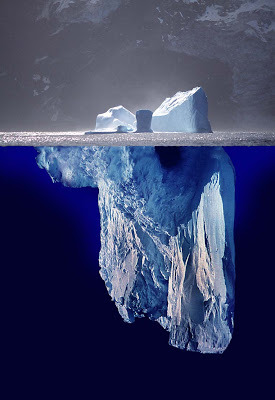 I have done some unforgettable kayaking and canoeing trips in my time, skimming across blue green prisms of water, trailing stunning coastlines and river banks, spying on nature in its quiet solitude.
I have done some unforgettable kayaking and canoeing trips in my time, skimming across blue green prisms of water, trailing stunning coastlines and river banks, spying on nature in its quiet solitude.
I remember one December sea-kayaking alongside Freycinet National Park in Tasmania; one moment we battled fierce headwinds as we tried to round a rocky headland; the next, a millpond in front of us where large stingrays appeared suspended below. One Easter, holidaying on Steward Island (New Zealand), we kayaked up Patterson Inlet. There, I encountered my first ever elephant seal. It was in a shallow bay, sighing and huffing so heavily I thought it must be a she, and in labour. Another time, we rafted down the fast-flowing snow-swollen Sunkosi River in Nepal. And, during one magical northern summer, in a Canadian canoe, we paddled the Bowron Lakes in British Columbia, a natural, 116 km quadrangle of rivers and lakes at 2,000 metres altitude on the edge of the Rocky Mountains. It’s deservedly one of the top 10 classic canoe circuits in the world. We drifted beside long-legged moose munching on sweet bulrushes; we saw the telltale signs of beaver homes. That trip made its way in to Books 2 and 3 of The Iceberg Trilogy.
But quite possibly, this all pales in comparison to the recent experience Jennifer Byrne had sea kayaking along the South-east coast of Greenland, near the 80th parallel. She writes about in her article, Out in the Cold, in the March issue of Qantas’ in-flight magazine.
Reading her account, I felt awe and envy. How do you capture the expanse and grace and otherworldliness of such a place? I think she comes close.
These kayak trips become the stuff of dreams. It is the silence, most of all. The blissful hush as we paddle through the still water, broken only by the splash of seals breaking the surface. The flapping wings of birds. The groan of glaciers and the warning crack of an iceberg about to overturn. We see everything more closely, away from the crowd and constant hum of the ship’s motors. … We paddle, then drift, then paddle again, turning circles around icebergs. … We learn how it feels to be in a world other than the one we know. My sharpest memory is of the silence shattered by gunfire, shot after echoing shot, in reality the sound of ice as the mighty Greenland ice sheet shifts, flows, settles – a living thing, 3 km deep at its centre – the sound of the Earth going about its business.
What about yourself? Have you had some amazing adventures out on the water? And what do you think about the pic above? It really is amazing how deep that ice sheet is.
The post The stuff of dreams appeared first on Sherryl Caulfield.
February 18, 2014
Must love wolves
Anyone who has read Seldom Come By might get the sense that wolves have a special place in my heart.
Some of my readers have asked how that came to be, given I grew up in rural Queensland, where the closest thing to a wolf was a TV cartoon series called: Cattanooga Cats. Do you know it? It featured a skit called: “It’s the Wolf” better known as “It’s the wool-uff!” For some reason, we – my parents included – had a fascination with this program. I loved the rock star cats; my elder bother, Greg, loved Motormouse and Autocat; and my sister, with her blonde curly hair, was nicknamed, Lambsy, after the frightened yet artful lamb forever chased by the wool-uff. The moniker stayed with her for 10 years.
There were no wolves on the sloping hills of Cedar Pocket that’s for sure. But there were rare sightings of red foxes. And whenever there were, my father would speak about them in gleeful tones: “Hello Mr Foxy Loxy.” As if they were long lost friends. His sister had married a man named Len Fox, so perhaps each time he saw them they reminded him of them. Who knows?
Even though European red foxes were an introduced species to this country they were relatively harmless to stock unless starvation or bravado forced them to raid your chicken coop. But mostly the sighting of a fox was a privilege – like the sighting of an iceberg for one Rebecca Crowe.
Many years later when I lived in Sydney I spent countless weekends in the Blue Mountains, rock-climbing, canyoning, bushwalking or horseriding in the Megalong Valley. One late September afternoon when I was horseriding by myself I came across a vixen and her cubs in a paddock that was dry and over grown with pale tussock grass. She stared at me, sizing me up, knowing instantly I was no threat to her or her young. Still, she decided to veer wide, but rather than duck under the barb-wired fence to make a quick escape, she nimbly climbed up the wooden fence post, perched ever so briefly atop to glance my way before bounding off. I loved that about her: her telling me she was leaving, not sneaking away and that her leaving was on her terms.
A few months after this encounter, I travelled to Sweden, where my partner’s brother and his wife lived about 90 minutes from Gothenburg. It was late January and each morning and afternoon we would crunch through tamped snow as we traipsed through hushed forests of spruce and birch. There, large elk roamed, carefree. So peaceful, so right, so at one with humanity.
In some things, LIKES absolutely attract LIKES. And I have been very fortunate in my life to share the communion of nature with other like-minded souls; to witness, in awe and celebration, the marvels of the animal kingdom.
Leaving Hils and Katsi was bittersweet. Ahead of us was the multi-isled city of Stockholm, with its Vasa Musuem, its Gamla Stan and its Skansen Zoo. It was there I came face to face with my first-ever wolf.
On a cool still morning I stood in front of a woven wire fence and stared at a grey Nordic wolf for so long that the fence disappeared. This wolf’s eyes were like none I had ever seen – not in a human or an animal.
Full of aquamarines and emeralds. Full of life, intrigrue and trust.
I can’t tell you how long I stood there staring at this wolf staring at me. I did not want to move. Neither did she.
That wolf made its way into Seldom Come By.
And so I wanted to share with you this amazing four-minute movie of the wolves of Yellowstone National Park. So you can see why I love wolves.
The post Must love wolves appeared first on Sherryl Caulfield.
February 12, 2014
Sharing the Love this Valentine’s Day
Over on my Facebook page I am running a 5 day promotion to celebrate Valentines day.
I am giving away 2 paperback copies of Seldom Come By to 1 lucky person and 2 ebooks to another – so you can SHARE the book, and the LOVE. To enter you simply have to:, with a friend OR give both copies away to 2 friends you love.
1) LIKE my page (if you have not already done so)
2) COMMENT on my giveaway post, tagging the NAME of the friend/s you would give a copy of Seldom Come By to if you won.
Tell your friends about it so they can enter as well  Competition is open worldwide!
Competition is open worldwide!
All those who comment up to 6 pm Monday 17 Feb AEST will go into the draw. The winner will be announced on my Facebook page on Tuesday 18 Feb, so please pop back then. If not claimed within 48 hours the prizes will be redrawn.
You can also earn BONUS entries, by commenting on any previous Facebook post – or any new ones I post over the coming days.
Please Note: this giveaway is not endorsed, affiliated with, or otherwise connected to Facebook in any way.
The post Sharing the Love this Valentine’s Day appeared first on Sherryl Caulfield.
February 3, 2014
When you can’t get past an experience
I had my first DNF (Did Not Finish) today. The reader couldn’t get past THAT Scene. You know the one that shan’t ever be mentioned here or over on Facebook.
I tried to encourage her to keep reading, to reassure her that life gets better for the people she had taken into her heart. But, no.
I understand why she was upset. Truly I do. I was a MESS writing THAT scene. I was a MESS editing THAT scene.
Adding to her distress was a lot of physical pain, for which she was on medication. Sadly, it was all too much.
“Tears fall and I ache,” she wrote to me. And: “Why?” And: “Reading books isn’t supposed to be…torture.”
I’m sorry for her that she invested so many hours reading my book and didn’t get to experience that satisfying feeling that comes at the end of a book that you so enjoy. For prior to this point she was enjoying it. She messaged me: “I woke up looking forward to reading your book. That’s how good it is!”
I appreciate her writing to me all the same and telling me what she thought. I really do. She was very polite and respectful. I would send her a gentle hug if I could but I’m not sure how welcome that would be. I sense she thinks I’m a tad disturbed or need counselling. For the record: Seldom Come By is not autobiographical.
The description of Seldom Come By reads:
“ But as the war moves towards its final harrowing days, they both discover that tragedy and terror can strike anywhere, setting their love on an unforeseen path.”
Harrowing. Tragedy. Terror.
Now, I’m wondering whether I should have a WARNING label on my book.
You will fall in love with people. At some point, terrible things will happen to them. BEWARE OF LIFE.
So did you want to throw my book at the proverbial wall?
Have there been other books or films that you’ve read or watched where you’ve gone: “No, I just can’t continue.”
I have walked out of two movies in my life – I should warn you I am a wimp when it comes to horror films. I don’t do scary or horror very well. Just ask my partner, Mark, or my work mate, Alistair.
The first was The Fly with Jeff Goldblum…in the wrestling scene when he snapped his opponent’s wrist and you saw the bone pierce the skin. Gasp! Gulp! Way too graphic for me.
The second was in Cape Fear, which had a great cast and came highly recommended by Melina, a part-time actress, with whom I worked. It was good but it was terrifying. I just wanted the Robert de Niro character to die. Die! And leave everyone in peace. Please! Near the end when he was riding under the car I just had to get up and walk out. I’d had a stressful week and wanted a relaxing, uplifting movie, not one that was going to give me a heart-attack in my late 20s.
There was another movie that I’m sure I would have walked out of, had I seen it at the cinema, and that was The Piano Teacher. Fortunately, we were at home watching it on video. Still, we had to pause it while I rushed to grab an ice-cold washer to drape over my face while I lay down and willed myself not to faint and willed myself not to think about what that woman had been doing with a razor blade. Some time later we decided we would continue. Surely it would get better. Surely this woman would redeem herself in some way? It was not to be.
So what about you? Have you had any books or movies you’ve had to pass on because the experience was unbearable? Care to share?
The post When you can’t get past an experience appeared first on Sherryl Caulfield.
January 24, 2014
Four lives – the price of my Australian heritage
Hello and thank you for stopping by my blog as part of the Australia Day Book Giveway Blog Hop. I recently released my debut novel, Seldom Come By, an epic adventurous love story set on the eve of the great war.
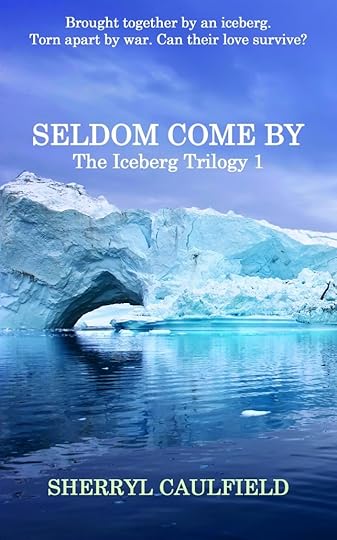 It was described in a recent review as: a great mix of romance, scenery, tragedy and history.
It was described in a recent review as: a great mix of romance, scenery, tragedy and history.
It’s true. I am attracted to all of the above. In celebration of Australia Day I will be giving away a copy of Seldom Come By – print or ebook – your choice – to someone who leaves a comment here to this blog. You need to comment by midnight AEST Tuesday 28 January. The winner will be announced towards the end of January.
I’m sorry to say, this is a longer than usual blog. How did that happen! I have decided to write about my Australian heritage, how this line of Caulfields came to be in Australia, and the price they paid. It is a story of hope, sacrifice and heartache. I hope you enjoy it. When you have finished reading and commenting hop back on the blog tour of over 50 blogs, where there are more book giveaways to be found. 
I was born and raised on a farm east of the gold mining town of Gympie, in a place called Cedar Pocket, once home to large stands of one of Australia’s few native deciduous trees, the Red Cedar. As far back as I can remember, both sides of my family were farmers – small crops and dairy. For many years, what epitomised being Australian to me, were the women and men of the land, summers spent swimming in free-flowing creeks and the odd dunk in the briny sea.
On Sept 11, 2001, when I was living in New Zealand, I received a life-changing call from my older brother. “This is it,” he said. “I’m walking off the farm.” All Greg had wanted to do with his life was be a farmer. He left school at 16 years of age to pursue his dream, pelting his school shoes at the wall, announcing with certitude that he was never going back. Twenty years later, despite working across three paw-paw farms and capping mineshafts, he was unable to meet his mortgage payments. His news was monumental and heartbreaking. Before I could ask a single question, he said. “I’m off to work in the mines.”
Little did we know at the time he was continuing a lost family tradition. Twelve hours later that date woud be seared in history.
Five years down the line, our father, at our urging decided to write his life story. One thing about our father, when he decides to do something he really does give it his all. Rather than write a simple memoir, he decided to trace the path of his forebears on the Caulfield side to understand how they came to be in Australia. His grandmother had died when he was two years of age; ten years later, his seldom seen grandfather, Charles, passed away. All he knew about his grandfather was he had a bunch of stepbrother and sisters; little more.
In January 2006 while holidayiing in Hervey Bay with my parents I typed the first chapter of my father’s story. In doing so I read the amazing details of the life of his great grandparents, James and Catherine. I was unprepared for the story he uncovered. I know they were not alone in the hardships they bore; yet they weren’t two historical figures to me. They were a young man and a young woman not in the prime of their life but in the promise of their life and this is their Australian story:
My great, great, great Grandfather, James Caulfield, lived near Dungannon, not far from the ruins of Castle Caulfield, the ancient Northern Island seat of King Colla da Crioch, whose descendants were named Caulfield. In the late 1840s he married Easter Canny and their first child, a son, also called James, was born in 1851. That same year, to escape Ireland’s ongoing, crippling, potato famine, they emigrated to Durham County, England.
There, in Tow Law, near Wolsingham, James found employment in the coal and iron ore mines, the extracts of which would be made into cannon balls for the Crimean War. Six short years later he was tragically killed in a mining accident, leaving Easter with three young boys, James (6), John (4) and Charles (a new born).
How she survived the next 15 years as a widow with three boys to rear, we do not know. All we know is that James went on to become an underground miner like his father. It was stated as his occupation on his June 1872 wedding certificate to Catherine McAninally. Their first child, a son born on the 10th May 1873, was also named James, following the family tradition.
Two years later, when their second son, Francis, was born, they took up the Queensland Parliament’s offer of employment in Queensland. Offers to those experienced in mining and related professions had been available in England for over decade and as an enticement included free passage to Queensland for their families.
It was no holiday. These migrant ships became known as Coffin Ships, due to the number of people who perished on the voyages.
The young Caulfield family left London on the 9th December 1875 aboard the Western Monarch, a new vessel launched only a few months earlier. On this crossing, 442 migrants were bound for Australia. On board were a surgeon, a Dr Harricks, and a nurse, Matron Randall. They were certainly needed. A bout of Enterin Fever – typhoid – went through the ship. Catherine and Francis, were two of its victims.
When the Western Monarch anchored at the bar in Moreton Bay, Brisbane, on 15th March 1876, it was boarded by the Qld Health Officer, Doctor Challinor.
Fortunately by this stage Catherine and Francis were recovering, however one remaining case of typhoid fever was found. The entire ship was placed in quarantine. The occupants were deposited on sandfly-infested Peel Island, which had scant facilities to cater for such a large group of people. Outraged and alarmed, the ship’s doctor, Harricks, wrote to the Brisbane Courier Mail warning that passengers would perish as a result. He requested that Catherine and Francis be transferred to the Brisbane Hospital. Sadly his requests went unanswered.
On the 19th March, baby Francis Caulfield died; three days later, his brother, James. They were buried on Peel Island in sight of their new callous country, which their parents had hoped would be a land of golden opportunity for them.
On the 27th March 1876 the Western Monarch was allowed to disembark at the Port of Brisbane. James and Catherine could finally start their longed-for, now grieving, lives in Australia.
They took the railroad to Warwick where they lived on its outskirts in the town of Clifton, while James worked at Elphinstone Colliery. On the 20th August 1878 they welcomed a new, Australian-born son, Charles. Just over a year later, on 4th July 1879, their fourth son, Henry was born.
Around this time tenders were called to extend the railway line 40 miles to the booming tin-mining area of Stanthorpe, a Latinised name meaning ‘tin village’.
James, because of his experience, was employed by a large construction firm, Overend & Co, managing a small team of men preparing the dynamite blasting of cuttings that would blow away the rock on the Stanthorpe to Warwick Rail line. Gangs worked night and day to complete the task.
When not working on the railway line James was busy building a small hut on a freehold 40 acre parcel of land, at Killarney south east of Warwick so his family could move there in 1880.
At ten past eleven on Friday the 2nd April 1880 at Cutting 81, near Mineral Creek, fourteen miles south of Warwick, James along with three of his team were preparing three holes for dynamite. He lit two of the three charges and after they exploded James went back to light the third. When it did not explode he returned to replace it with another when it suddenly exploded shattering his right hand and wrist and tearing away the left part of his face. Michael Considine, one of his employees, raced to his aid, asking him if he could stand up. “Yes,” he replied. Then: “God help my wife and family.”
He was placed on a mattress on a spring cart and frantically transported along the railway line while a runner was sent to Warwick for a doctor. They were met at Rosentahal Creek six miles from Warwick.
Meanwhile, Catherine had just finished packing up their rented home in Clifton to move to Killarney to the hut her husband had finished building. When she arrived in Warwick a day later, she asked about the whereabouts of her husband James.
“That’s him in the funeral coffin in the street,” she was told.
He had died within minutes of seeing the Doctor.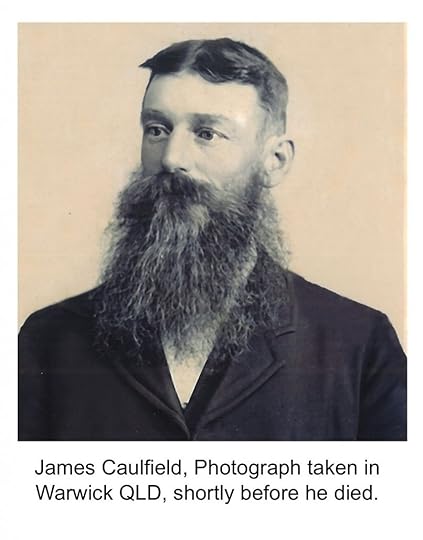
Somehow, someway, Catherine continued on to the meagre hut and farm her husband had prepared for her. I can’t imagine how she managed to survive those months alone, in the middle of nowhere, with two babies under two, curious aborigines peering through the cracks of her cobbled home, unable to read a single book for company. Six months later, her youngest son, Henry, died, leaving Charles – my great grandfather – the only suriving son of her late husband, James.
In the process of researching James’ history my father discovered his headstone on the Warwick Cemetery Heritage Trail. The column top was broken, not a mark of vandalism but symbolic of his life being cut short; it was lying on the ground having fallen out of its base. His infant son Henry had his inscription on the headstone as well.
This December just passed, as my father and I drove south to Tamworth for his sister’s funeral, we called in to the Warwick cemetery on a hot glaring day to visit the gravestone of my great, great grandfather, whose headstone my father had lovingly restored. James Caulfield, was 27 years old when he died.
Eight months later to the day, Catherine married a bachelor, Thomas Brennan, 20 years her senior, signing her second marriage certificate with an X.
With heartfelt thanks to my father, for his hours of research in documenting our family history.
The post Four lives – the price of my Australian heritage appeared first on Sherryl Caulfield.
January 21, 2014
Join me for the Australia Day Book Giveaway Blog Hop
I’ve signed on to the Australia Day Book Giveaway Blog Hop.
“What is this?” I hear you ask.
A collection of Australian authors and bloggers (50 at last count) will publish a new blog post at midday AEST on 25 January. They will also give away an Australian book, ebook or gift certificate of their choice. ( No guesses what I’ll be giving away  )
)
So WOW – 50 books by Australian authors up for grabs and many of these comps open to readers anywhere in the world.
(An FYI for you overseas folk we celebrate the arrival of the First Fleet in Australia on 26 January – Australia Day.)
To be eligible to win, you simply have to leave a comment to my post on my blog and you will have till midnight on Tuesday 28 January to do so. No problem if you are away for the long week-end; you will still have time. The winner will be announce at the end of January and chosen at my discretion.
It’s the same routine with the other bloggers – you just have to hop on over to their blogs and comment on their posts. To help you with this, there will be an online directory provided by Book’d Out (This is Shelleyrae’s brainwave and she is hosting). It’s a first for me so I’m trusting the process will all become clear for me and for you.
I’ve been pondering all week what to write about and trying to pinpoint when I first identified as being Australian.
In 1976 I remember being in awe of Nadia Comăneci and her perfect 10s at The Summer Olympics in Montreal. I wanted to be her! Romanian!
Yet, at the same time, I had a bizarre fixation with a maroon sports bag with the word ‘Queensland’ emblazoned across it. You couldn’t buy such an item. Only an elite few carried them casually over their shoulders. For me it was the pinnacle of sporting achievement – the badge of honour you received for making a Queensland sport’s team. At 11 years of age it was all I wanted. For me, making a Queensland sport’s team, would be like making it in New York…I’d make it anywhere.
Funny. Not so. Some days I think I peaked too young!
So when did my patriotic Australian pulse flicker on?
I remember Australia winning the America’s cup. That was great, but being a struggling university student, we didn’t even have a television set to watch the champagne popping celebrations. I remember Australia’s Bicentennary. I went to a rooftop party at a friend’s place in Neutral Bay, Sydney. What a day and night it was. The fireworks were spectacular. It looked like Sydney Harbour Bridge was one giant wax candle, melting in flames. However, if I were honest, I didn’t feel the adrenalin of it in my veins that day either, despite all the magnificent tall ships and they were magnificent – but just imagine a harbour with ONLY tall ships in it – hmm, now that would have been something!
Oddly on that day, there was a little bit of: “Oh so now we celebrate the founding of Australia by convicts, when once we didn’t want to know them.” A touch bittersweet don’t you think? And without an apology in sight I doubt it was a great day for our indigenous Australians either.
Ah…Cathy Freeman winning Gold at Sydney’s Olympic Games. Now you’re talking! In my lounge room – in New Zealand, no less – she brought me to my feet. I imagine she brought every Australian to their feet. A lithe aboriginal woman, a shining Queensland woman with the weight of the entire nation on her shoulders – you go girl. What a night of tears and elation it was!
Maybe that was the moment.
But as my Kiwi neighbour, Bernie, liked to say to me, and often: “What would you know? You’re from awe–strucking–failure.”
And so I have decided to write about my Australian heritage, how this line of Caulfields came to be in Australia, and the price they paid. Given what I now know, it has great meaning to me. In 2005 my father spent a year researching our family history and recording his own. It was a year very well spent. Come join me on the week-end sometime to read a very personal and true story of hope, sacrifice and heartache.
The post Join me for the Australia Day Book Giveaway Blog Hop appeared first on Sherryl Caulfield.
January 18, 2014
Bellagrand – Can it be as beautiful and as grand as The Bronze Horseman?
The Bronze Horseman by Russian born, American author, Paullina Simons is my favourite teenage love story; the trilogy, one of my favourite series of all times. And so it was in late 2012 when a prequel was released telling how Alexander Barrington’s parents met and fell in love in Boston in the early 20th century the book could have been called Great Expectations, such was the antipation for this novel.
I carved out a few days to read Children of Liberty and then afterwards I was in a total slump, not because I had a book hang-over but because I had a book blah. Despite the wonderful prose, I could not feel the love between the main characters. I could not understand the attraction. I could not put fingers to keyboard to write about it. So I picked up other books, continued with my own writing, while I waited and hoped that the next one would move me like her other breathtaking books.
I’m pleased to say Bellagrand has – but not for the reasons you might expect. And even though this book did not make me fall in love with Gina and Harry, even though it did not break my heart over them it certainly made me FEEL – which for me is paramount – and what I felt most was the heartbreak of a lone sister. Esther.
It was interesting how that came about. The story is largely told from Gina’s point of view, with only the briefest snippets from Alexander’s as bookends and just a sliver of Esther’s. But that was all it took. In a café in Casuarina, heavy tears coursed down my cheeks as I read her last agonising conversation with her nephew, Alexander.
If you have read The Bronze Horseman you will understand everything. If you have not, then I’m not sure how much you will enjoy this book. Earlier this week I spoke to a friend, also a TBH fan, who was half way through Bellagrand. Her words: ‘Man it’s depressing. Does it get any better? I know they have to go through all this stuff to get to Russia but sheesh!’
That’s it in a nushell. If you haven’t read Bellagrand and want to, then leave this page now. Shoo! Go!
If you have read Bellagrand, please tell me what you thought. I’d love to hear and chat. Here’s my in-depth, spoiler-filled summation.
There was many a time when I was reading Bellagrand when I wanted it to be about a different Gina from Sicily and a different Barrington boy from Boston – not one destined for the depressing, dire mire that was Russia in the 1930s. The reason for this: Gina’s husband, Alexander’s father, Harry, was such a selfish, deceitful character that I wanted to punch his lights out on so many occasions and throw my book at the wall. One of the major downsides – I have since discovered – to having an eReader.
In the opening chapters when we discover that Gina has supported Harry for seven years – seven years! – while they lived in her mother’s meagre home in Lawrence, while he fluffed about ideologising and doing God knows what, I found myself struggling to relate to this woman and this man. I could not relate to how that situation had not worn her down into a resentful, loveless woman who had little, if any, respect for her husband. I could not understand how Harry did not feel the tiniest bit emasculated by their situation, emasculated enough to get off his posterior so his wife did not have to work so tirelessly at three jobs.
The story started to get interesting when Gina falls pregnant for the first time, only to miscarry her baby due to being caught in an industrial riot. At which point Harry finallly finds his caring, protective muscle in a backhanded sort of way – telling her: “I told you to stay away.”
There are lots of political, union and socialist discussions as well as current event updates throughout the novel that I waded through at times. I understand why they were there. I understand what those people were fighting for and how their struggle has meant better working conditions for almost everyone I know. [Yet sadly, is a struggle still taking place right now in many countries like Cambodia.] I understand how these were core to Harry’s beliefs and dreams for a new world order but I found them a bit dragging. That said, as an Australian who has not studied 20th century American history, the story did send me googling people, places and events and I think how these figures, such as Big Bill Haywood and Anna LoPizzo, were woven into the story was commendable. I just would have preferred less.
Respite comes when Harry is serving one of his longer jail terms and his best friend, Ben, returns from a decade in Panama where he has been building the ground-breaking (pun intended) canal. And in that disheartened world that Gina is living, she finds a new Eden, and Ben’s unrequited feelings for this once-spirited Sicilian beauty become no longer unrequited. Oh, the vicarious thrill of their Christmas lights and their iceskating lake and and their sleepless Saturday nights. Finally, someone who really cherishes her! What I wouldn’t have given to be inside Ben’s head and to read what this must have been like to pine after a woman for 15 years before finally consummating that relationship. Ever since the early days of Children of Liberty when we first met Ben I’ve found him to be the more spirited, interesting character with visionary ideas of his own that were life affirming and exotic.
However in the limbo of their bliss Harry is released from prison and Gina decides to return to him.
“He gave up everything to marry me,” she tells Ben.
“Maybe he didn’t value what he had,” Ben said cooly, “Did you ever think of that? Does he value you?”
Exactly. Ben saw it all.
Harry loved his ideals more than he loved Gina – despite his words arguing to the contrary. And argue they did, not about Harry’s beliefs as much as his irresponsibility, until one brief pause when they make love and their flailing union renders Gina pregnant for the seventh time, as the Spanish Flu arrives and does its best to assail her and half the people around her.
Being ill, unable to work, with Harry back in jail, and anxious of losing her baby, Gina does what Harry has been unable to do. She drags herself out of her sickbed and trains to Barrington to beg for help, for Harry’s baby. Miraculously, the Barringtons do not turn her out. Hermann even admires her. And, despite everything, Esther finds a common cause to side with Gina: new life, a child that she could never bear herself. And, bizarrely, there is clemency for Harry in exchange for house detention in a grand house in Florida bequeathed to him by his mother, which was bequeathed to her by none other than a flamboyant discarding lover.
Bellagrand, their mansion by the sea.
One of the hallmark’s of Paullina’s writing that I adore is her lyrical alliteration. We saw it in The Bronze Horseman: Luga, Ladoga, Leningrad, Lazarevo. And in this one too: Belagrand, Belpasso, Boston, Ben.
Bellagrand: their short-lived, sedate version of the roaring twenties; their overdue Lazarevo. And as a curtain raiser, Harry’s lovesick letter to Gina penned before they even married. Now we are finally reading how he truly felt for her way back when.
“I want nothing in my life as much as you…You are the muse to my every insipid utterance.”
I get why Harry loved her. I just wanted to hear him tell us why. He loved her because she was unique, like Susan Sarandon walking down the street. She was his angel who kept house, cooked divine meals, provided for them and was a sex goddess at night. Yet, did he love her enough?
What did she see in him? I kept on searching the pages for the answers. I rationalised that she loved him because he was a passionate and original thinker, highly intelligent, her partner in repartee. She loved his sacrifice, what he gave up for her, she loved that he loved her and, it would appear, that he was a good lover, he certainly made her hit the higher octaves. And I think she loved him because he still had a father, like she had once had a father whom she adored, and what she longed for was the perfect family of three generations of men together.
Certainly Hermann’s coming to Bellagrand was monumental, the happiest of times – aside from the infuriating conversations with Harry, like the widget one where Harry could not concede a single valid opposing point.
But too soon afterwards Hermann dies in Boston and Harry does not attend the funeral. Gina goes as their sole representative. And during the wake, which Ben attends with his new Panamanian wife, Esther at long last perceives Gina and Ben’s secret affair. That night, Esther accuses her sister-in-law of thrice ruining any chance of happiness she could have had with Ben, despite her affections being unreturned. Esther understood exactly what had happened each time, but she did not understand Gina’s motivations, falsely accusing her of being manipulative and plunderous, all the while Gina sat stone-faced, unable to defend herself without incriminating herself.
Gina returns south, to the magnificent comfortable, carefree life she enjoys with her husband and son, except with Harry’s release from house arrest, he wants out. “I want to go back to Boston – to be closer to Esther – she’s the only family I’ve got!”
True, true true, but lies, lies lies. And what about Gina’s brother, Salvo, who had moved across country for them?
I hated Harry’s deceipt, his lies by omission. Back in Boston I wanted Harry to be trampled in some union riot. I wanted Ben’s innocent wife to be caught up in some Panamanian landslide so Gina and Ben could be united and Alexander would still have a ‘father’ to look up to, a builder and engineer extraordinaire.
Because from thereon their life in Boston starts to dissipate and fracture as Harry’s appalling deceptions slowly surface. It really goes down the sewer and there are a few minor details in this section that don’t entirely synch with The Bronze Horseman series – their citizenship situation being the case in point which really is the penultimate punch in the gut.
“She was too proud to let him see the heartbreak in her humbled spine.”
As we near the novel’s end Gina makes the irreversible decision to stick with Harry and go to Russia with him and for me it was like the end of the movie Breaking the Waves. In this film, Bess, a young, simple woman (played by a young Emily Watson), returns to a masochistic, torturous sex house – all to please her husband. She ventures into her own death – as does Gina.
At this point I wanted to slap Gina. I wanted to lock Harry far far away on that island in Russia – the one they kept on talking about.
But what did Gina do? She went to bed with him in the middle of the day – sorry? – what? – that noise you are hearing is the needle scratching across the record.
“Unfed, unquenched, unresolved, Harry and Gina undressed and in bed tried to feed and quench and resolve themselves. They always had that to fall back on, the white rumpled sheets of their mutual ardor.”
I could not get my head round that. Not the day time sex, but the anytime sex. I don’t know how she lay down with him ever again.
Esther had said earlier: “Your charms didn’t work on my brother.” But his obviously worked on her, and still I could not see it…was it just his whispering to her in Italian? Did she put up with all his crap for that?!
Bellagrand is Gina’s story… We never get inside Harry’s head enough to love him. In The Bronze Horseman we were inside Alexander’s head at various points and those were powerful – Shura washing the blood off Tatiana at Luga, his arrival in Lazarevo, his chats with Dimitri. And then there was The Bridge to Holy Cross. In this book there are no sections that I recall from Harry’s point of view and I think perhaps this was a deliberate move so we were always closer to Gina, always on her side.
For me the most powerful scenes in the book were Esther’s: her venting after her father’s funeral; her plea to Harry and Gina not to leave America, begging for Gina to stay behind with Alexander. Breathtaking!
“Gina I’ve reconsidered all my previous positions. Imagine what a shifting of the sands this is for me. Please forget everything hurtful or hostile I’ve ever said to you, and forgive me. But please – don’t do this. Your son is your ladder to the stars. He deserves better than this.”
(Your son is your ladder to the stars = my favourite line of the entire book!)
Her silent plea to her brother:
You are the only family I have left. You, your wife, my beloved boy. Once you leave, I will have nothing. You’re going to a dreadful place, yes, but your also leaving me and that feels so wrong. How can you not understand that? Do I have to even say it? She didn’t. She couldn’t.
And her final conversation with Alexander in the park across the road:
“Thou shalt not be afraid for the terror by night, nor for the arrow that flieth by day, nor for the pestilence that walketh in darkness, nor for the destruction that wasteth by noonday, a thousand shall fall at your side, and ten thousand at your right hand, but it shall not come near thee.”
Heartbreaking! At least we know he memorised it like she asked him to. Bittersweet. I would have liked to have seen more of just Alexander and Esther.
Even though the last few chapters build to an absorbing climax Bellagrand is not an uplifting story and, I admit, I like a happy ending, or at least an ending that has some degree of implied hope and promise. And I also like my antagonists to redeem themselves in some way.
So although I did not love this book – I did love a lot of the secondary characters and Gina too for most of the time. I hated her agreeing to go to Russia. Yet without that, there would be no Bronze Horseman. Such a bind. Ultimately, I think Bellagrand made me love the TBH series and Alexander even more, because of his mother’s sacrifice. I’m glad he got to live the American dream, because for his rudderless mother it was tragically too short.
The post Bellagrand – Can it be as beautiful and as grand as The Bronze Horseman? appeared first on Sherryl Caulfield.


